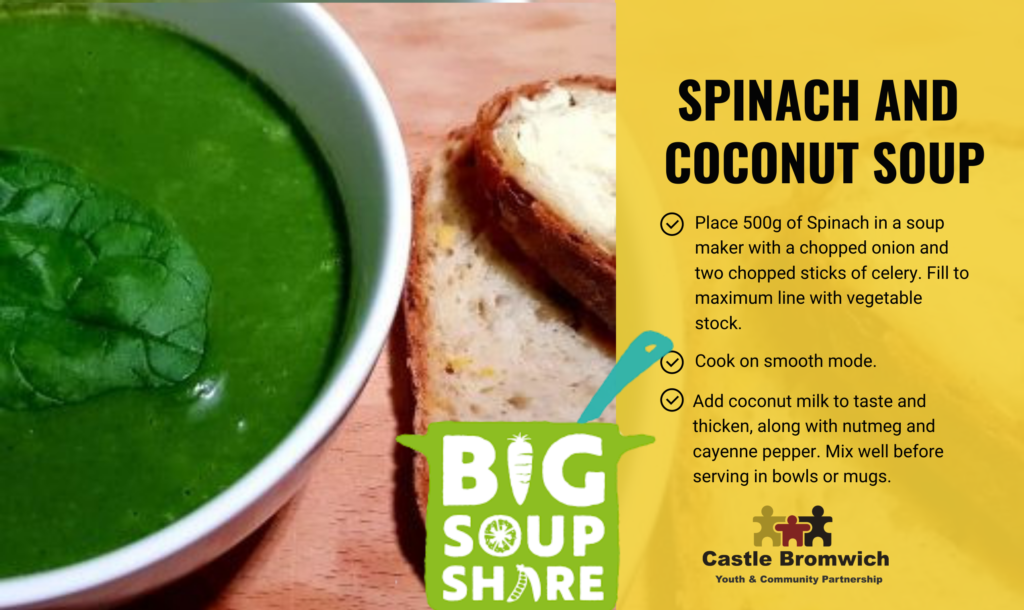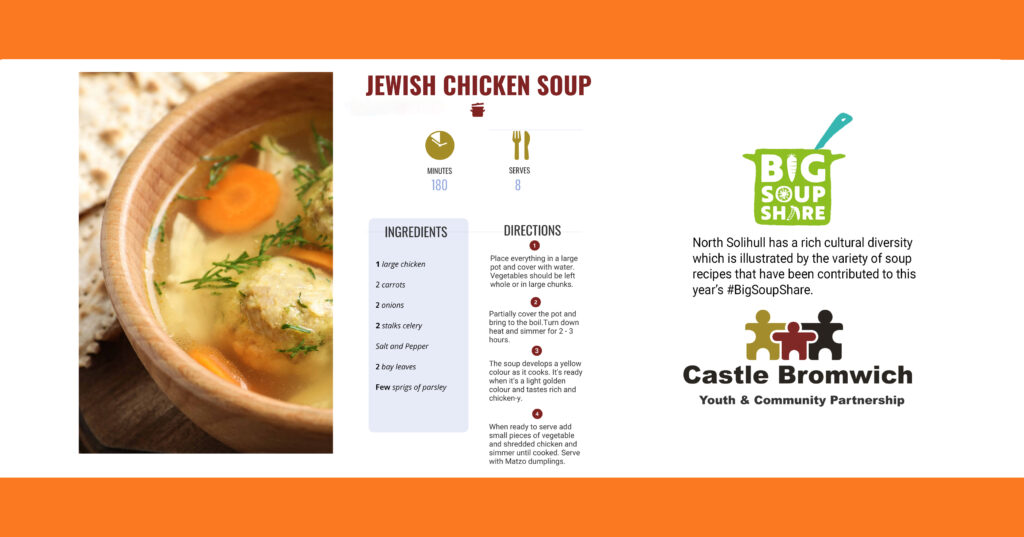Food Traditions Are the Vital Ties That Hold Us Together
Passover. Christmas. Ramadan. Lunar New Year. Ramanavami. Passata day. Sunday lunch. No matter what your cultural background, the traditions of food are central in connecting family, friends and community.
We can all be taken on a nostalgic journey by the symbolism of certain foods, whether the context is cultural heritage or geographic location. Today’s #BigSoupShare is a Scotch Broth recipe adapted from the traditional Scottish Sheep’s Head Soup. A Castle Bromwich resident told us:
When my Scottish grandmother died in 1956 my grandfather decided to cook for himself, trying to replicate recipes which his wife had previously cooked for him. One of his ventures into home cooking was Sheep’s Head Broth, the recipe presumably handed down from grannie’s ancestors. I’m not certain which other ingredients were added to the head but definitely pearl barley, onions and root vegetables grown in the garden. I cannot remember eating it or its tantalising aroma but one thing does stay with me, afterwards grandad would spread out all the bones from the sheep’s skull in front of me and promptly give me a lesson in anatomy.
Cooking a sheep’s head may not have stood the test of time, but we’ve adapted the recipe to provide a tasty Scotch Broth.
Food Is Not a Moral Issue – The Pleasure and Anxiety of Eating
Asking people for their favourite soup recipes has sparked some interesting discussions about the importance of food in our lives, not only for nutrition, but also how it is integral to both how we view ourselves and how others see us.
Today’s recipe is from a Fordbridge resident who told us that as a child they felt that they were judged to be part of a bad family based on the food they ate. This provoked some food anxiety and they set out to eat a “healthy diet”. Their recipe of Spinach and Coconut Soup was influenced by childhood viewings of Popeye and his consumption of Spinach. It firmly set in their mind that Popeye was a good person, not only because of his behaviour, but because he consumed healthy, nutritious food.

Food in our house was determined by what you could forage and what was cheap and filling. I always felt that this made me lacking compared to my wealthier friends. I realised that food had a hierarchy. My mother would come in from working in a factory and hurriedly prepare thick slices of crusty bread and dripping sprinkled with salt. They were served from a cracked pottery plate in the middle of the table. I’d jostle with my brothers and sisters for the best slices. We’d eat them from our hands, without a side plate to place them on. We were noisy, boisterous and, despite my mother’s best efforts, lacking any pretensions of table manners. Such simple food provided us with enormous pleasure.
My best friend’s father was a Wing Commander in the RAF. Tea in their house was very different. Their mother didn’t work and cooking was more than a necessity, it was something she took pleasure from; or so it seemed to me at the time. Tea was dainty triangular cut ham and tomato sandwiches served on individual bone china plates. These were followed by iced fruit cakes and a piece of fruit.
I once over-heard some teachers talking about the food that children took into school. They were quite disparaging about parents who allowed children to take the contents that would fill my lunch box. There was a moral judgement made that they were some how bad people because of the food they “chose” to feed their children. As I got older, I realised that the type of food that I was eating wasn’t the only thing that was being judged, but also my lack of refinement in the way that I consumed it. My lack of etiquette seems to equate in other’s minds to moral degeneration.
I remember that this started to play on my mind, and I asked my father to get an allotment where we could grow vegetables. And, that’s what we did. I’m not sure that our meals changed dramatically, but they were always served with plenty of vegetables. And, bread and dripping alternated with bowls of hot vegetable soup in winter and tomato salads in the summer.
As an adult I realise that things were not quite as black and white as I thought as a child. My friend’s mother didn’t enjoy cooking. She also felt judged and pressurised to perform the role of the “good mother”. Even the upper classes felt the need to conform, sending their children to finishing school to learn the social requirements of food preparation, serving and etiquette. Despite this realisation, I’m still fearful about how my food choices might be judged. I rarely eat outside my own home and choose to shop online rather than face the critical eyes of others’ judging the contents of my food trolley. There is a voice in my head that constantly repeats the middle class mantra, “It’s just as cheap to eat healthily.” But, I am reminded of George Orwell’s “The Road to Wigan Pier”:
“Would it not be better if they spent more money on wholesome things like oranges and wholemeal bread or if they even, like the writer of the letter to the New Statesman, saved on fuel and ate their carrots raw? Yes, it would, but the point is that no ordinary human being is ever going to do such a thing. The ordinary human being would sooner starve than live on brown bread and raw carrots. And the peculiar evil is this, that the less money you have, the less inclined you feel to spend it on wholesome food. A millionaire may enjoy breakfasting off orange juice and Ryvita biscuits; an unemployed man doesn’t. Here the tendency of which I spoke at the end of the last chapter comes into play. When you are unemployed, which is to say when you are underfed, harassed, bored, and miserable, you don’t want to eat dull wholesome food. You want something a little bit ‘tasty’. There is always some cheaply pleasant thing to tempt you.”
What We Eat Shows a Road Map of Our Lives

What we eat tells a story about who we are. How we eat and talk about food is central to our identities. This week we are taking part in the #BigSoupShare. We’ll be sharing soup recipes from North Solihull residents who will also explain how their choice is reflection of who they are.
Today we are sharing a recipe for Jewish Chicken Soup which has been provided by one of our volunteers who lives in Chelmsley Wood. We were told that growing up food was integral to how their family lived, with strict rules around what could be eaten and how it should be prepared. The only food that they were given was traditional Jewish food. “Until I became an adult, I had no idea what cottage pie was because it wasn’t part of the food eaten in my family home.”
Folklore suggests that a hearty bowl of chicken soup can cure all manner of illnesses. So pervasive is the belief in the healing power of chicken soup – “Jewish penicillin” – that scientists have tested it in the lab. One such study undertaken in 2000 concluded it was the anti-inflammatory properties of many of chicken soup’s ingredients that helped ease the symptoms of a cold by reducing congestion. So with winter just around the corner, there’s no better time to try this immunity-boosting recipe.

Ingredients
1 large chicken
2 carrots
2 onions
2 sticks celery
2 bay leaves
2 sprigs parsley
salt and pepper
Directions
- Place all ingredients in a large pot and cover with water. Vegetables should be left whole or in large chucks.
- Partially cover the pot and bring to the boil.Turn down heat and simmer for 2 – 3 hours.
- The soup develops a yellow colour as it cooks. It’s ready when it’s a light golden colour and tastes rich and chickeny.
- The broth can be set on one side or frozen until required. When ready to serve add small pieces of vegetable and shredded chicken to the broth and simmer until cooked. Serve with Matzo dumplings.
Graveyard Heritage Trail Wins Heritage Lottery Fund Support
Castle Bromwich Youth & Community Partnership has received £26,900 from the Heritage Lottery Fund (HLF) for an exciting project to create a heritage trail which explores the stories behind the headstones in Castle Bromwich graveyard. Led by volunteers from the local community the project will focus on the lives of people buried in the graveyard to highlight the rich heritage that exists within the conservation area.
The project will allow local residents to discover how the area has changed and how these changes have impacted upon the lives of people living in Castle Bromwich. Young people will talk to older residents and record their oral histories to capture how various wars have affected the area, along with changes in health care, transport and communication.
The research will result in the installation of interpretation boards, as well as the production of an audio heritage trail, a photographic art project and information booklets.
Castle Bromwich Youth & Community Partnership is a volunteer organisation which promotes intergenerational working and the sharing of skills within the community. An integral part of the project will be the opportunity for local residents to gain skills through volunteering and learn more about their community and environment.
Commenting on the award, Terrie Knibb said, “We are thrilled to have received the support of the Heritage Lottery Fund and are confident that the project will give young people the opportunity to talk to older residents and capture their memories and knowledge for future generations whilst building their own skills to utlise in their careers.”
100 Years of Anti-Social Behaviour
We live in a decaying age. Young people no longer respect their parents. They are rude and impatient. They frequently inhabit taverns and have no self control.” Inscription, 6000 year-old Egyptian tomb.
It seems like hardly a day passes when the media doesn’t show images of anti-social behaviour coupled with rising demands for action to deal with the escalating menace, but a newspaper article we found today shows that such behaviour is nothing new for Castle Bromwich:
Whitstable Times and Herne Bay Herald – Saturday March 21st 1903
In the neighbourhood of Castle Bromwich there are some ruffians who are carrying out the old but dangerous trick of tying cord across the roadway with the object of upsetting wheelmen. Already a large number of cyclists, both male and female, have been thrown from their machines, but very fortunately, without sustaining serious injuries.
A vigilance committee has been formed by wheelmen in the neighbourhood, and every effort is being made to capture the perpetrators of the dastardly action, who run a great risk of having to answer the grave charge of manslaughter.



